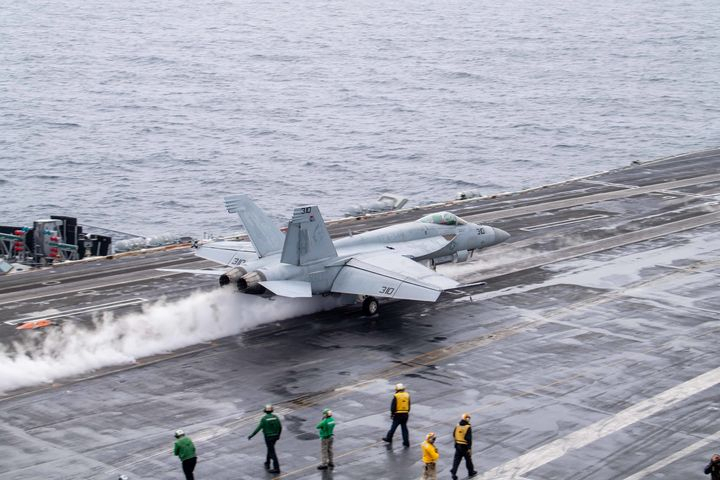
 |
| This photo shows a Super Hornet fighter jet taking part in the first multi-domain exercise of Freedom Edge held by South Korea, the United States and Japan in international waters, south of South Korea's southern island of Jeju, on June 28. (US Navy) |
South Korea, the United States and Japan were set to begin their second trilateral multi-domain exercise on Wednesday, the South's Joint Chiefs of Staff said, in ongoing efforts to strengthen security cooperation against North Korea amid its deepening alignment with Russia.
The three-day exercise will take place in international waters south of South Korea's southern resort island of Jeju, the JCS said, around four months after the inaugural exercise was conducted in accordance with an agreement reached by the leaders of the nations last year.
The second round of the Freedom Edge exercise will mobilize various warships and aircraft from the three sides, including the US Navy's USS George Washington aircraft carrier, the South's ROKS Seoae Ryu Seong-ryong destroyer and Japan's JS Haguro destroyer.
The JCS said the exercise will span across an array of areas including air defense, ballistic missile defense, anti-submarine warfare, maritime interdiction and defensive cyber training.
"The three nations have strongly condemned North Korea's provocative acts, including the test-launch of an intercontinental ballistic missile (ICBM), that threaten peace and stability on the Korean Peninsula and within the region," the JCS said. "The exercise reflects the will to deter and respond to such threats."
The North launched the new Hwasong-19 ICBM on Oct. 31 and called it an "ultimate" version of its long-range missile series. The missile reached the highest altitude and flew for the longest time.
The drills came amid growing concerns that North Korea's troop deployment to Russia could escalate Moscow's protracted war with Ukraine.
In August last year, President Yoon Suk Yeol, US President Joe Biden and then Japanese Prime Minister Fumio Kishida agreed to hold "annual, named, multidomain" trilateral exercises on a regular basis during their summit at Camp David as part of efforts to deter evolving nuclear and missile threats from North Korea.
In July this year, the defense chiefs of the three nations signed the Trilateral Security Cooperation Framework, in a move seen as formalizing their security cooperation and strengthening cooperation against North Korea's nuclear and missile threats, including conducting regular joint drills. (Yonhap)









